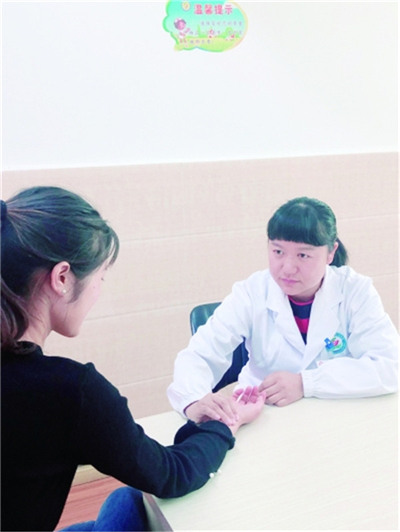Doctor helps Tibetan women lead healthy lives

"Thank you, Dr Zheng. Everyone in my family is grateful for your help," a new Tibetan mother said to Zheng Yuzhen, a doctor in the Department of Gynecology and Obstetrics at Diqing People's Hospital, in Diqing Tibetan autonomous prefecture, in Southwest China's Yunnan province, after she gave birth to a baby girl.
With the help of Zheng, the Tibetan woman finally became pregnant after years of trying, and she gave birth to her first child in 2019, after 10 years of marriage.
Zheng is one of two daughters of a rural family in Eshan Yi autonomous county, in Yuxi, a city in Yunnan. Despite being illiterate, Zheng's mother was determined to fight conventional prejudices against women, and she ensured her daughters received an education.
To support her two daughters, she got up in the wee hours every day to make steamed stuffed buns, and she sold the buns in a nearby market. At that time, Zheng told herself she must study hard to repay her mother.
Zheng's family was in debt in 2002, around the time she was about to sit the high school entrance exam. Her parents were having a difficult time feeding the family, let alone paying their daughters' tuition fees and the other school-related expenses.
One day, Zheng's father received a phone call from the principal of her middle school, and the principal explained Zheng was qualified to receive financial assistance from the Spring Bud Project.
The project, the principal added, would allow Zheng to attend a high school in Kunming, capital of Yunnan, without having to pay tuition fees. After she heard the news, Zheng was overwhelmed with gratitude and excitement.
Zheng was curious about everything when she first arrived in Kunming in 2002. Studying in the city was like a dream come true for Zheng.
It didn't take Zheng long to overcome either her homesickness or her poverty-induced-inferiority complex. She quickly started her new life in Kunming, where she gained confidence and performed outstandingly well at school.
Zheng says the teachers in the Spring Bud class treated her and the other students as if they were their own children. She recalls how one teacher once carried her on her back to see a doctor when she was sick and couldn't hail a taxi.
Teachers often showed the students around in Kunming, to further expand their horizons. Zheng also got along well with her classmates.
Zheng regularly shared what was going on at the school with her younger sister, and, whenever possible, she would save money to buy new clothes for her mother.
Zheng's father paid more attention to her academic performance than he did previously, and he said it had been the right decision to send Zheng to study in Kunming.
Three years later, Zheng was admitted to Jiangxi University of Chinese Medicine, in Nanchang, capital of East China's Jiangxi province. She became the first person from her hometown to attend college.
After she received her master's degree in clinical gynecology of Chinese and western medicine, from Yunnan University of Chinese Medicine, in Kunming, Zheng joined the staff of Yuxi Hospital of Traditional Chinese Medicine, in Yuxi. She eventually accepted a position at Diqing People's Hospital.
Zheng could have landed a job at a better hospital, but she declined several offers because she wanted to work in Diqing. She believed she would put her talents to better use by helping the women in Diqing lead healthier lives.
"Women in Diqing need me. They need to obtain more knowledge about gynecological health, and to learn how to take better care of themselves. I can help them deal with gynecological health problems," Zheng says.
She has grasped all opportunities to visit, chat with and share knowledge (on how to prevent diseases) with local women. She also responds to their questions via phone calls and WeChat messages.
Zheng often talks with pregnant women and their family members about the importance of gender equality. She says every birth deserves to be blessed, and every child deserves to be loved and respected, whether it is a boy or a girl. The love and equality she felt in the Spring Bud class is now being passed on to the others.
The Tibetan woman, who gave birth to her first child in 2019 with the help of Zheng, sent Zheng a photo of her child taken on her first birthday. As she looked at the photo, Zheng said she believed the girl will have a bright future.


